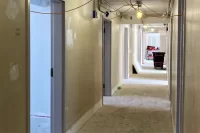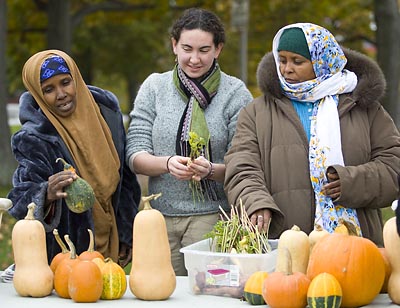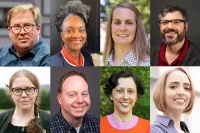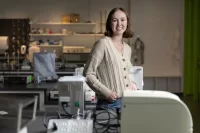
Cornfield as Classroom

Sarah Davis '10 (center) with NASAP growers at the Lewiston Farmers' Market.
If soup makes the soldier, as Napoleon Bonaparte said, it does a pretty good job shaping students, too.
Issues around food have an unusual teaching potential, a power rooted in one simple fact: everybody eats. And its branches reach out to nearly every corner of the human endeavor.
At Bates, the topic of food tends to invoke “issues of stewardship and sustainability, writ large,” says Anna Bartel, associate director of the Harward Center for Community Partnerships. “And poverty and social justice, because there’s no escaping the fact that food is huge in terms of social inequity.”
That scope holds true for the community activities, both volunteer and academically driven, that the Harward Center funds and coordinates year-round.
For instance, this past summer Sarah Davis ’10 worked for a Maine-based nonprofit, administering the Lewiston Farmers’ Market and helping immigrants learn the ways of American farming.
Meanwhile, Ariel Garfinkel ’08 taught kids in Lewiston where food comes from and how to cook it. Also working with youth was Andie Bisceglia ’09, who spent her summer at the Hillview apartments running a program for Lots to Gardens — an agency, founded by Kirsten Walter ’00, that uses gardening projects to strengthen community and support local young people.
For all three, the summer work illuminated the studies that awaited them when autumn came around. In her Harward-funded position with the New American Sustainable Agriculture Project, Davis guided farmers from Somalia and Guatemala in getting their produce to market. “I learned so much about the people that I worked with,” she says.
The work gave her “a first-hand perspective on the idea of difference” — a perspective valuable to her self-designed major exploring issues of difference and conflict in a context of social justice.
As a vehicle for teaching, food is distinctively useful as an exemplar across disciplines. “Pedagogy functions on the assumption that we start where people are and push them to someplace new,” Bartel says. “And everyone can start where they are with food. So pedagogically, it’s really powerful.”
All the more so given today’s mass critique of the food-industrial system. “Food and sustainable agriculture are perfect examples of readily identifiable areas where ordinary citizens can actually do a fair amount of research,” Bartel adds.
“There’s a lot of good information out there,” she says. “People can move from problem identification to problem solving, to living in a set of commitments that promote sustainable answers. And that, right there, is the model of what we think liberal education is doing in the world.”
“I came to Bates just wanting to be an environmental studies major,” but not knowing how many directions that might take her in, says Bisceglia. “There’s just so many options. And I think farming and local food combine them all.”
By Doug Hubley, photograph by Phyllis Graber Jensen



